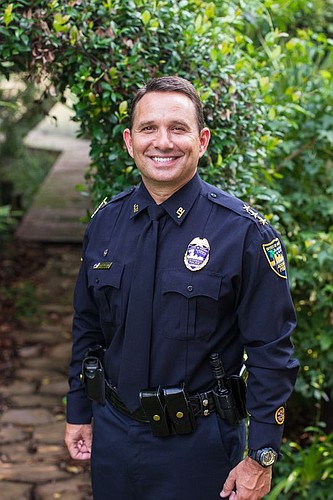
When Mike Williams was a rookie cop in 1991, he learned the value of being engaged with residents.
He watched as his training officer worked hard to gain the trust of the residents in Springfield. The officer didn’t just occasionally talk to residents. It was part of his daily routine. Instead of going to a restaurant for lunch or dinner, he’d eat with them in their homes.
It was an eye-opening experience.
“This guy was really engaged,” Williams said. “He was a great policeman because of that.”
That’s an approach Williams adopted. He knew taking five minutes to talk to someone raking leaves or outside a convenience store would help him do his job. To have someone trust him enough to come up to him and say, “Hey, officer, he went over there.”
Williams said making sure line-level patrol officers have more contact with residents is something that will happen if he’s elected Jacksonville sheriff.
The contact has to go beyond when officers are responding to calls.
That relationship is especially critical now, he said, as the murder rate continues to rise and violent crime is constantly in the news.
He will continue efforts like Operation Safe Streets and Operation Ceasefire, which devote officers for specific periods of times to concentrate on high-crime areas. Those programs are often welcomed by most residents, he said, especially when they know the purpose behind them.
He said police knocked on 7,000 doors in one month during the first Operation Ceasefire, telling residents why they would see more officers in the neighborhood.
“We got zero complaints from the community,” said Williams, who retired in August to run for sheriff.
Building those relationships is something you have to work on every day, Williams said. Otherwise, you’re losing ground.
“You’re either improving it or it’s getting worse,” said Williams, a veteran supervisor at the agency.
Making sure officers have enough time to get to know residents is critical. Ideally, he said, officers would have 45 percent of their time free to do that.
But, he said only officers in Zone 6 on the Northside are at that mark. Four of the remaining five zones are in the 30s, with the Westside zone in the 20s. He attributes the latter number to the zone being large and having a significant number of less-experienced officers.
Williams said drugs drive a considerable amount of the rising violence in the community. They also fuel the gang problem and are a big part of the illegal gun trade.
“All of those things really overlap. You can’t look at them in a silo,” he said.
Williams said he will continue to work with state and federal agencies to build a reputation that dealing drugs in Jacksonville will be costly.
He wants the message to be: “Your people will go to jail. You will lose product.”
The increase in murders is reminiscent of the mid-2000s. The city responded by adding police officers; starting the Community Service Officer program to handle non-criminal calls; and implementing the Jacksonville Journey, a crime prevention program introduced by former Mayor John Peyton.
The murder rate dropped to as low as in the 1970s, Williams said.
As the economy crashed, tightening budgets led to fewer police officers, cutting the Community Service Officer program and gutting the Journey’s programs. As a result, he said, murders and other violent crimes went back up.
Mayoral candidate Lenny Curry said his first priority is finding the $14.7 million to hire 147 police officers. Even then, it takes about 11 months to get an officer ready for the streets, plus all 147 officers wouldn’t be hired at one time.
Quicker help could be available by hiring 40-50 Community Service Officers, who can be ready in three to four months. That would free up time for uniformed officers, said Williams, calling it an “immediate force multiplier.”
An enforcement strategy will have an immediate impact, he said, but the long-term solution is through prevention programs, like those in the Journey.
Williams thinks the Police Athletic League is a great tool to reach children, especially those at a vulnerable age. The nonprofit recently added a center at Mallison Park off Lenox Avenue, its third in Jacksonville.
He believes the agency needs to find new ways to educate and reach the public. The 19-year-old Sheriff’s Advisory Council is still important, Williams said, though many of its members of retirement age.
He thinks it’s time for a new generation to come forward and he knows he’ll have to communicate with them differently.
“Those guys may not answer letters, but they will answer email, a text or go on Facebook,” he said.
All new avenues to build relationships.
@editormarilyn
(904) 356-2466